Hello to everyone visiting the Monosasu site.
My name is Sugimoto, and I'm a freelance writer living quietly in Kyoto.
I have been serializing " The Girls of Kamiyama, " an interview series with women who moved to Kamiyama, Tokushima, and I once wrote about a roundtable discussion on the " musicality of writing " that was held in Kamiyama on the Monosas website. It was a great roundtable discussion.
I usually visit Kamiyama once every three months.
I wonder when I'll be able to go next.
The impact of the spread of the new coronavirus is being felt in many places. I heard that everyone at Monosus has also started working remotely. Taichi Manabe, former head of the production department (currently in the design department), thought that people may be finding it difficult to communicate online things that they had previously shared "somehow" while working in the same place.
Comment from Manabe
I moved to Kamiyama, Tokushima six years ago. It was shortly after I was appointed head of the production department. Since then, I commute between Kamiyama and Tokyo, and only see the members in person about once a month. The rest of the time, we've been communicating through daily chats, video conferences, and emails.This team is not based in our own office, but is based at the client's office, and although "autonomous decentralized" sounds modern and good, we have all worked together to create a style that is "not" managed. I planned this article to share the core and surrounding know-how of this work, as I thought it would be of some help in the "new lifestyle" that we will be living in from now on.
In response to Manabe-san's wish, I have decided to help with this article. Now, let's get started with the online interview, Pochi.
People who gathered

- Former head of the production department. The initiator of this project. Sixth year of remote work.

- Team leader. Joined from home with his beloved cat.

- A veteran planner who also works overseas.

- After joining Monosus, he immediately became a full-time director. His symbolic hat is still on display even when he is working from home.
To encourage people to speak honestly about what they're thinking, we'll introduce our speakers with these icons:
The "three sacred treasures" of advancing projects online
First of all, I would like to ask what tools you use and what kind of ideas you use to proceed with projects online.

- At Monosus, we use Google Cloud's G Suite. We use the tools available there to run our projects.
- The most important thing is to not let information become personal. We create a "PJ folder" that contains folders that organize the elements that make up the project in a shared master folder, a "PJ sheet" that consolidates important information about the project, and a "PJ mtg note" that is used in regular meetings attended by all members. We thoroughly use these three things, which we call the "three sacred treasures."
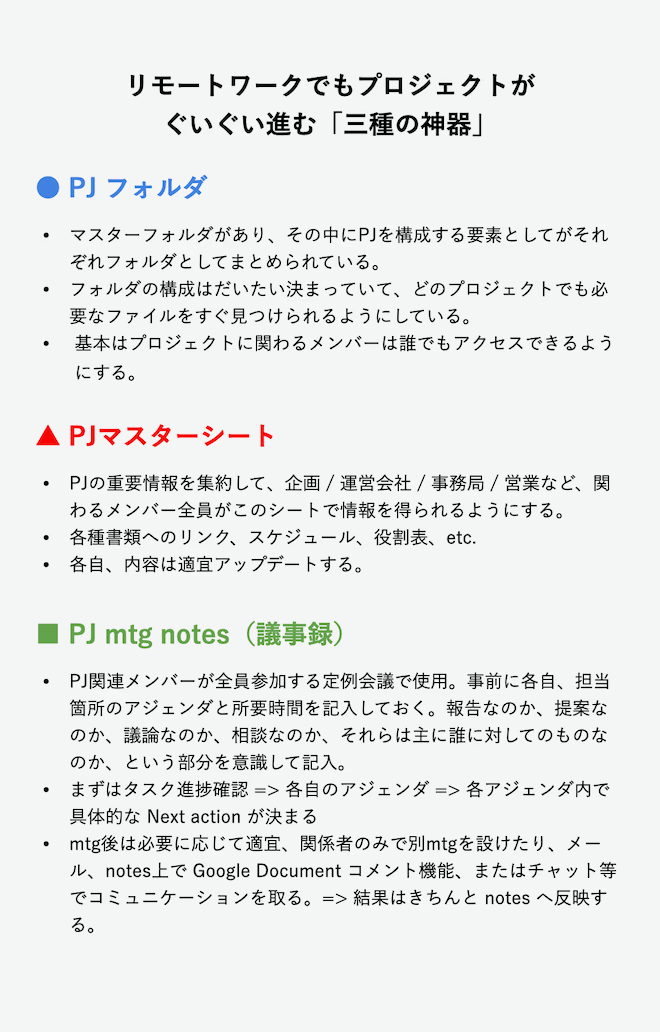

- With this, even if a new member joins in the middle of a project, they can still understand about 80% of the current situation. I think the key to progressing a project online is to create a situation where everyone can access the information they need at any time.
Okay, so what about online meetings?

- If the meeting continues for a long time, people get tired and it often becomes meaningless. Therefore, we try to limit the meeting time to the things we want to discuss and the matters on which we want to unify our views. We don't spend time simply sharing information, such as schedules and estimates.
- At the same time, not everyone has a high level of literacy when it comes to G Suite tools, so there will be people who are unable to access information. For this reason, we have prepared a project master sheet as a place where people can "find out everything by looking here."

- I really feel that the project moves forward by holding meetings, which are a forum for discussion. That's why we can't neglect meetings, and everyone is extremely tense when they attend. If we don't have that kind of awareness, meetings might end up being a low priority.
What do you think are some ways to improve the quality of meetings?

- Designing an agenda for "what to talk about" is difficult if you don't have a bird's-eye view of the matter. It would be nice to set up a meeting manager for each meeting, but it's hard if you don't have the resources. First of all, I think it's a good idea to decide on roles such as facilitator, speaker, note taker, etc. and put them on the calendar every time.
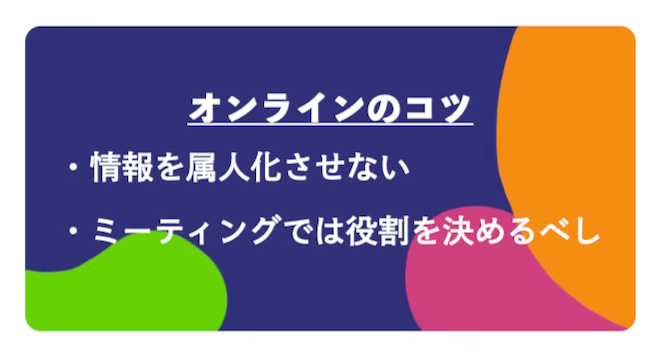
Tips for smooth online conversations
When you first started working online, how did you learn to do so?

- The clients I worked with were used to working on projects online, so I think there were parts where I just imitated what they did, like shadowing.

- I was originally a freelancer, so I was used to the whole team working remotely. However, I had never used G Suite before, so I had to get used to the tool.
Do you think it will be difficult to transition to remote work when not all your team is accustomed to working online?

- That's right. It might be more efficient if someone who is familiar with it could guide them. At Monosus, I think there is at least one person in each unit who has high literacy in online tools, so I think it would be good to create the way each team does things with that person at the center. Or, if we train those people and spread it to each team, it might be more efficient for everyone to learn.
When we had a meeting before the interview, I found it very easy to talk to everyone because they were all used to communicating online.

- I think there is a gap between ease of speaking. People who are not used to online meetings tend to speak at the same time, or no one speaks after everyone has given way to others, saying "please, please." Or, it tends to happen that some people speak and others don't.
- If we are used to it, we can say, "Please go first," or "Oh, I'll speak first," even if someone else is speaking at the same time, and when we want someone else to speak, we may naturally be able to ask, "What do you think about this, Mr./Ms. XX?"

- In real life, you can tell from someone's facial expression and mood that they're thinking about something, but it's hard to convey that online, so I think it's important to at least respond. Even if it's just a simple "Hmm, I see," I try to convey that communication has begun.
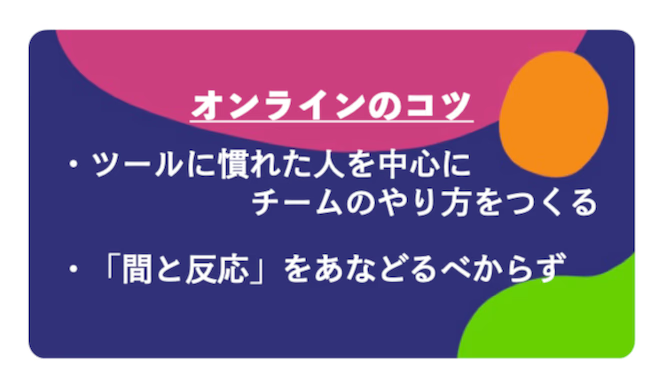
A prescription for "problems where you can't chat online"
I heard that some teams usually work remotely, so when they meet face-to-face, they have a strong shared experience, such as an escape room. They also make time to meet for tea or create threads for casual conversation.

- Whether online or offline, I always set aside time at the beginning of a meeting to break the ice and start with some casual conversation, such as, "How is everyone's week going?" or "What did you do on your day off?" If you start listening to someone without speaking, the tension of not speaking will be maintained, so it's a good idea to have people speak at the beginning, even if it's just to say their name.
- Also, if we have a 3 p.m. meeting, I might say, "Let's go get some coffee," and we'll all start talking in a relaxed state while drinking coffee.
I see. So by sharing the experience, it feels real even though it's online. Have you ever worked as a team in a fully online environment?

- Last year, we had a project with members from the US, India, and Japan, but we only met face-to-face for about 30 minutes. The rest of the time, we were online, but we were able to build good relationships. We had meetings about three times a week, and I have the impression that we naturally chatted about trivial things like, "What's the temperature in India right now?" and "Are you sleeping well?" Thanks to that, we were able to complete the project without any problems.
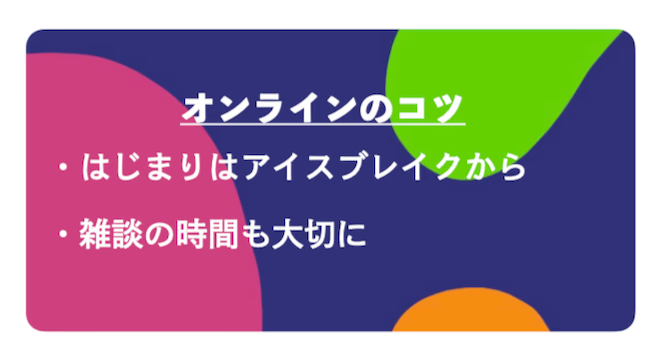
Be intentional about building relationships
How do you deal with disagreements or hostility in online interactions?

- If the person is someone from the same company, I leave them alone for a while. If you force communication, it can make things worse. After 2-3 days, when you feel more comfortable, you can start communicating. Being able to leave them alone is also a good thing about online meetings. Also, when it comes to meetings with clients, it's a business relationship, so it doesn't become tense.

- When communicating without seeing each other's faces, for example if things become tense over chat, you can sometimes resolve the situation by saying, "Let's talk for a bit."

- Even in meetings with clients, discussions do get heated. However, it is not a fight, it is just a discussion, and I say what I want to say without making any strange concessions. This is largely due to the culture of the client company that accepts any statement.
- I think the biggest factor is that we have a common understanding that we are not just discussing to get our opinions across, but that we are discussing to make the project a success together. Another factor is the culture of respecting the project owner (person in charge). If the discussion ends without any progress, we commit to what the project owner has decided.
Are there any other ways you can communicate online?

- Overseas teams send messages of thanks to each other that may seem a bit excessive to Japanese people. For example, they say "Perfect!" just for sending a link. I think that this kind of exchange is part of how trust is built.
When working remotely, it's hard to see each other's task status, which would be obvious if you were working in the same place. How do you communicate with each other?

- If you absolutely need to secure work time in one go, or if you don't want to have any events scheduled, put "No events allowed" on your calendar. If you see that, you'll know that the person is busy. If you still need to talk urgently, I think it's okay to just let them know.
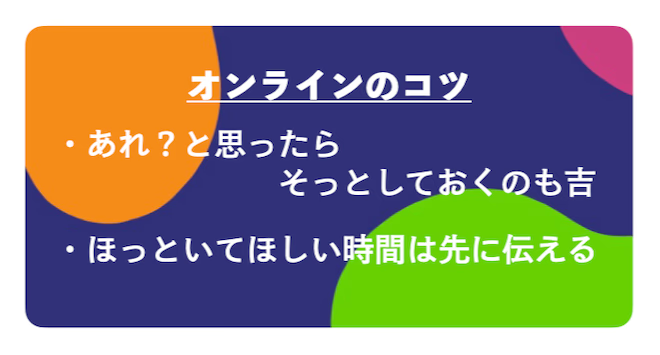
Remote work makes us rethink the meaning of belonging to an organization

- What I'm wondering about this is, now that everyone is working remotely, how do you feel about the meaning of belonging to an organization?

- I think people's sense of belonging to the company has increased when they heard (Monosus CEO) Hayashi say at the general meeting, "Monosus will protect everyone's jobs." In this situation, of course, the whole company could go under, but I think there is a sense of security that they can at least survive for a few months, maybe a year.

- Just like here, I think having colleagues in the same organization who think from the same perspective is a strength in terms of mental health as well. When you're freelance, you have to think "What should I do?" on your own.

- We have a strong sense of team-to-team relationships with our clients. Even in the current situation, some of our clients are thinking about ways to continue working. On the other hand, we are also working on a large part of projects with freelance partners, so I think we need to proactively reconsider the opportunities and scope of work we can collaborate on in this situation.
The shift to remote work has also become an opportunity for people to reexamine the meaning of being an organization and relationships both inside and outside the company.

- I think that's a big part of it. In that sense, I once again realized that the Monosasu Site was a shared space within the company, just like the kitchen in the office. I want to make it a place where things that connect employees can come out under these circumstances. I think there are other things that can be seen from there.
thank you very much!
After the roundtable discussion, Manabe shared his comments.
Monosus underwent major organizational restructuring this April.
Monosus discussed what "good team, good work" means, and reorganized the organization, which had been operating centrally in relatively large units called "business divisions" with the CEO at the core. Each member has just started working toward becoming a team that can operate independently and decentralized (modern style) in small units called "units" with 3-7 people who are easy to see.
In the midst of this, a state of emergency was declared.
There is no way to know what would have happened if we hadn't restructured the organization at that time. Now, each of us is talking to each other in the unit, and various initiatives are beginning to take shape without relying too much on the chain of command from the center.
Even during the COVID-19 pandemic, Monosus is still going at its own pace, and we are doing our best to be of some help to you and to the world by honestly sharing what is happening right now!

